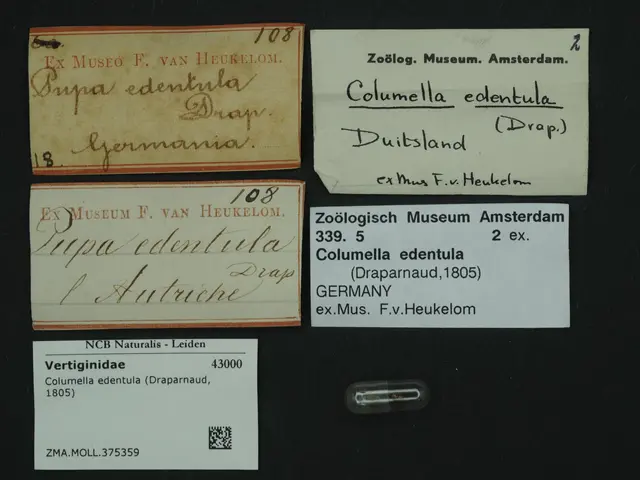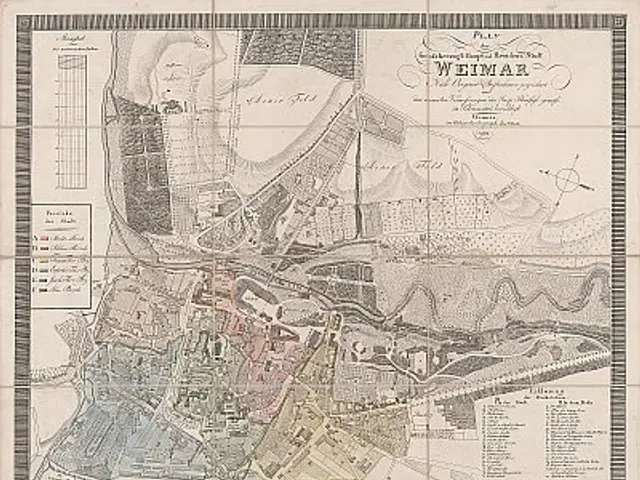Industrial Development Spurred Forward, According to Tokayev at Industry Event
In Kazakhstan, significant strides are being made in the transport sector, positioning the country as a vital transit hub between China, Europe, and South Asia.
One of the most anticipated developments is the completion of a second railway track between Dostyk and Moyinty, a crucial part of the transit route connecting China and Europe. This project, expected to be finished this year, will boost the corridor's carrying capacity fivefold [1].
President Kassym-Jomart Tokayev has also emphasized the strategic role of Kazakhstan's transport sector in its economic growth and regional integration. In line with this, the country is building over 1,700 km of new railway lines and modernizing 3,000 km of existing tracks [1]. By 2029, the country plans to reconstruct 11,000 km and build an additional 5,000 km of railways, a move aimed at boosting freight turnover and transit traffic significantly.
The development of strategic logistics hubs is another focus area. The Tobyl transport and logistics complex in Kostanai, covering 133.6 hectares, is currently under construction with a $121.4 million investment. Once completed, it is expected to handle up to 400,000 TEU (twenty-foot equivalent units) annually, creating 500 jobs, and integrating with international transport corridors [3].
Enhancement of civil aviation infrastructure is also a priority. Kazakhstan is modernizing its airports and expanding air transport connectivity. Last year, new terminals were launched in Almaty, Shymkent, and Kyzylorda, significantly expanding airport capacity in the country. Currently, Kazakhstan operates 582 weekly flights to 31 countries [2].
Kazakhstan's strategic direction in civil aviation and air cargo transportation is impacting its economic growth, international standing, and sovereignty [2]. To further strengthen its status as a regional aviation hub, a national air cargo carrier is being planned.
In addition, Kazakhstan is making unprecedented efforts to improve national and local roads. Last year, 7,000 kilometers of roads were commissioned, including the modernization of major routes like Taldykorgan-Oskemen, Karagandy-Almaty, and Aktobe-Atyrau-Astrakhan [5].
President Tokayev's call for strengthening local manufacturing in the transport machinery sector through partnerships with leading global companies is also being addressed. This initiative aims to boost Kazakhstan's transit potential and foster bilateral economic cooperation, as demonstrated by the $500 million deal with Afghanistan to develop the Herat-Torghundi railway [4].
Kazakhstan is also expanding its direct air connections with more than 30 countries, and efforts to expand these connections will continue. The country currently serves as one of the key transit hubs of Eurasia, according to Tokayev [6].
Moreover, the Trans-Caspian International Transport Route (TITR), connecting China, Central Asia, and Europe, is being developed by Kazakhstan. The country is also making strides in regional railway connectivity, as evidenced by the joint logistics center launched with China in Xi'an under the Belt and Road Initiative [6].
The nation's commitment to transport infrastructure development is evident in the honours bestowed upon its transport workers. More than 770,000 transport workers, including Kaltai Sambetov, a veteran of Kazakhstan Temir Zholy with 66 years of continuous service, received the nation's highest honor, Kazakhstan's Hero of Labor [7]. Other transport industry veterans, such as Boris Isinamanov, Vladimir Averkin, Kanat Shaimin, and Andrei Gorvat, also received the title of Honored Worker of the Transport Sector of Kazakhstan for their contributions to infrastructure development and modernization.
In conclusion, Kazakhstan's ongoing transport infrastructure projects aim to increase freight capacity, streamline logistics, diversify transport modes, and integrate the country into broader Eurasian transport corridors, solidifying its status as a vital transit hub between China, Europe, and South Asia.
References: [1] https://www.khabar.kz/articles/2023/04/27/kazakhstan-will-invest-1-trillion-tenge-in-the-development-of-railways-by-2029/ [2] https://www.khabar.kz/articles/2023/04/18/kazakhstan-aims-to-become-a-major-regional-hub-for-air-travel-and-logistics/ [3] https://www.khabar.kz/articles/2023/04/12/kostanay-region-will-get-a-new-transport-and-logistics-complex/ [4] https://www.khabar.kz/articles/2023/04/18/kazakhstan-will-invest-500-million-dollars-in-the-development-of-the-railway-in-afghanistan/ [5] https://www.khabar.kz/articles/2023/04/27/7000-kilometers-of-roads-were-commissioned-in-kazakhstan-last-year/ [6] https://www.khabar.kz/articles/2023/04/20/a-joint-logistics-center-with-china-was-launched-in-xi-an/ [7] https://www.khabar.kz/articles/2023/04/27/president-tokayev-honored-more-than-770000-transport-workers/
The government's investments in transportation infrastructure, such as the development of new railway lines and airports, are not only boosting the capacity of Kazakhstan's transport sector, but also positioning it as a key player in the international aerospace industry.
To further bolster its economic growth and regional integration, Kazakhstan is also focusing on the finance sector by partnering with leading global companies to strengthen local manufacturing in the transport machinery sector, particularly in railway development.








